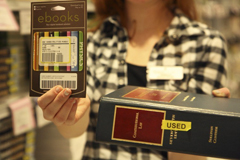The Pulse Archives
To e-book or not to e-book?
By Phillip Bowie | Pulse Staff Reporter

Are e-books the future on college campuses?
Photo by: Emily Walter
The possibility of e-books replacing traditional textbooks is a hot topic on campus.
An e-book, according to Bing, is a battery powered portable reading device displaying text on a high-resolution screen.
Professor Amy Clark, a licensed professional geologist, said when it comes to the topic of e-books that she is old school and prefers to have a book that she can refer back to.
“I would rather have a book on site. That way, when I need to get to some information, I can just open my book and not have to rely on an Internet connection,” said Clark.
One type of device you can use to download books is a Kindle, which comes in different versions, such as the Kindle Fire, Kindle DX or the Kindle 3. The Kindle brand is one of the more popular devices for book readers. The iPad, Nook Simple Touch Reader, Nook Tablet and Sony Reader are more e-readers to choose from. But the question that most of us have to ask ourselves is this: Is an e-book better to have than a textbook, or is a textbook just as effective?
Clark also discussed how e-books are sometimes not cost effective. Once you buy the e-book, you can’t return it like you can a textbook, and you may have to purchase additional software if the course requires you to do so.
Steven Rodriguez, a sophomore Communications major, said, “I like having an e-book for some classes and a textbook for others.”
A few places to purchase an e-book can be at online websites, such as Amazon and eBay. Palo Alto College also sells e-books in the bookstore, and the Ozuna Library has e-books available to you for free.
Celeste Frausto, a sophomore Kinesiology major, said, “I think students should be able to buy a copyright of the text and have the option of keeping it on an e-reader or printing it out at a reduced cost.”
Tiffany Reese-Smith, a sophomore Geology major, said, “An e-book wouldn’t be beneficial for me, because I would rather have a physical book to hold, than to read one on a screen.”
Dr. Dorothy Haecker, a Philosophy professor, discussed the pros and cons of textbooks and e-books. Haecker said an e-book is lightweight compared to a textbook, making it very portable, and that you can have numerous books on it. She said one of the major cons of having an e-book is that if something happens to the technology, then it’s useless.
“It is depended upon a vast web of interconnected virtual realities,” said Haecker.
“iPad or a Kindle would be ideal for e-books because people don’t generally read in front of a computer,” said Greg Pasztor, a Communications instructor.
According to Texas A&M University of San Antonio website an, e-book fee is automatically included in your tuition bill. If you don’t use an e-book, the fee still applies.
March 2012
- Father, mother, sister, brother attend Palo Alto
- Palo Alto recognizes teaching excellence
- Construction projects receive mixed feedback
- SOPA and PIPA remain mysteries for most
- Student veterans organization provides support
- Bikeshare program cruises into Palo Alto
- Another green year at Palo Alto
- To e-book or not to e-book?
- Palo Alto, the college for you
- Ten tips for successful learning
- Healthy steps for a balanced life
- How to write a resume the right way
- Why graduate and not just transfer?
- Sweet Anticipation: Spring Break 2012